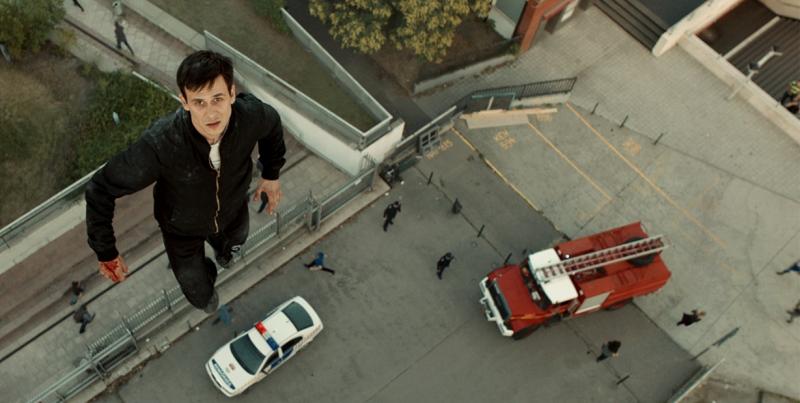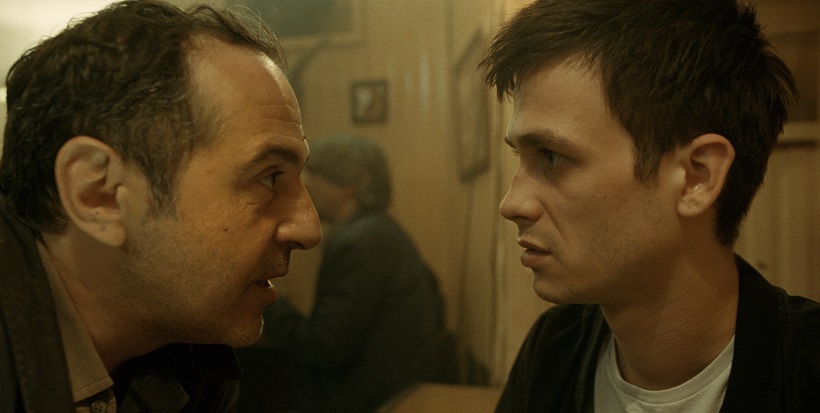DVD: Jupiter's Moons | reviews, news & interviews
DVD: Jupiter's Moons
DVD: Jupiter's Moons
Hungarian sci-fi, philosophical medley proves a rough, rewarding ride

There’s a terrific drive to Kornél Mundruczó’s Jupiter’s Moon, a cinematic powerhouse of both technique and ideas. The maverick Hungarian director’s film, which premiered in last year’s Cannes competition, may occasionally bewilder – such is the spectrum of subjects upon which it touches – but rarely fails to impress.
The energy of its opening takes us right into the frantic disorder of Europe’s refugee crisis, as an attempted border crossing – a rush from a crowded lorry onto boats – is intercepted by troops. A single figure flees, only to be felled by gunfire, before rising into the sky in a whirl of levitation: in a moment Mundruczó has stepped away from realism into its magical variety. His young hero is Aryan (Zsombor Jéger, doleful, soulful), a Syrian refugee separated in the confusion from his father, whose bewildered negotiation of the new world that he has entered, one that will prove far from kind, provides the film’s sometimes surreal journey.
The youth’s new ability has not passed unnoticed. He’s pursued by the same security forces that failed to apprehend him, while falling into the care of refugee camp doctor Stern (played by Merab Ninidze, the Georgian actor last seen in the BBC’s McMafia, as pale as ever, pictured below with Jéger). The latter, with his own murky associations and a past to expiate, becomes something of a father-figure, though his motives – to hawk these miraculous talents around ailing patients, refreshing them with some new, transcendent wonder – are initially mercenary. But a closer bond gradually establishes itself between these two lost souls, despite the hesitant English that is their only means of communication (it’s a somewhat "Europudding" combination not enhanced by some haphazard doubling). Mundruczó and his co-writer Kata Wéber dial up the mystical element as the levitation scenes – they may not have quite the same angelic connotations as Wim Wenders’ Wings of Desire, but they’re not far off, either – bring religion into the equation, with Aryan (son of a carpenter, no less) pitched as a contemporary Christ figure. The world he has possibly come to redeem is sorely in need of said treatment, including a presentation of contemporary Hungary’s political extremism (as incisive as it was in Mundruczó’s previous film, the canine-themed White God), plus a plot cross-strand (ultimately rather extraneous) involving terrorism.
Mundruczó and his co-writer Kata Wéber dial up the mystical element as the levitation scenes – they may not have quite the same angelic connotations as Wim Wenders’ Wings of Desire, but they’re not far off, either – bring religion into the equation, with Aryan (son of a carpenter, no less) pitched as a contemporary Christ figure. The world he has possibly come to redeem is sorely in need of said treatment, including a presentation of contemporary Hungary’s political extremism (as incisive as it was in Mundruczó’s previous film, the canine-themed White God), plus a plot cross-strand (ultimately rather extraneous) involving terrorism.
Technically it’s all extremely accomplished, from the levitation elements – what a long way a little CGI can go – to a terrific single-take car chase through the streets of Budapest, and a shape-shifting interior scene that surely riffs on Christoper Nolan’s Inception, all the product of outstanding cinematography from Marcell Rév. But all such invention on big visual elements would be nothing if the director didn’t convey the micro-mood of his world so well: its theme colour is a sickly nocturnal yellow, Mundruczó’s characters pallid and clearly still dealing with the traumas of the 20th century as well as the issues that the new one has brought. It’s a potent and somehow very European cocktail – the title’s allusion is to a planetary moon, apparently a cradle of possible new life forms, that is named after our continent – from a director who is never afraid to set his sights as high as his characters fly.
Overleaf: watch the trailer for Jupiter's Moons
There’s a terrific drive to Kornél Mundruczó’s Jupiter’s Moon, a cinematic powerhouse of both technique and ideas. The maverick Hungarian director’s film, which premiered in last year’s Cannes competition, may occasionally bewilder – such is the spectrum of subjects upon which it touches – but rarely fails to impress.
The energy of its opening takes us right into the frantic disorder of Europe’s refugee crisis, as an attempted border crossing – a rush from a crowded lorry onto boats – is intercepted by troops. A single figure flees, only to be felled by gunfire, before rising into the sky in a whirl of levitation: in a moment Mundruczó has stepped away from realism into its magical variety. His young hero is Aryan (Zsombor Jéger, doleful, soulful), a Syrian refugee separated in the confusion from his father, whose bewildered negotiation of the new world that he has entered, one that will prove far from kind, provides the film’s sometimes surreal journey.
The youth’s new ability has not passed unnoticed. He’s pursued by the same security forces that failed to apprehend him, while falling into the care of refugee camp doctor Stern (played by Merab Ninidze, the Georgian actor last seen in the BBC’s McMafia, as pale as ever, pictured below with Jéger). The latter, with his own murky associations and a past to expiate, becomes something of a father-figure, though his motives – to hawk these miraculous talents around ailing patients, refreshing them with some new, transcendent wonder – are initially mercenary. But a closer bond gradually establishes itself between these two lost souls, despite the hesitant English that is their only means of communication (it’s a somewhat "Europudding" combination not enhanced by some haphazard doubling). Mundruczó and his co-writer Kata Wéber dial up the mystical element as the levitation scenes – they may not have quite the same angelic connotations as Wim Wenders’ Wings of Desire, but they’re not far off, either – bring religion into the equation, with Aryan (son of a carpenter, no less) pitched as a contemporary Christ figure. The world he has possibly come to redeem is sorely in need of said treatment, including a presentation of contemporary Hungary’s political extremism (as incisive as it was in Mundruczó’s previous film, the canine-themed White God), plus a plot cross-strand (ultimately rather extraneous) involving terrorism.
Mundruczó and his co-writer Kata Wéber dial up the mystical element as the levitation scenes – they may not have quite the same angelic connotations as Wim Wenders’ Wings of Desire, but they’re not far off, either – bring religion into the equation, with Aryan (son of a carpenter, no less) pitched as a contemporary Christ figure. The world he has possibly come to redeem is sorely in need of said treatment, including a presentation of contemporary Hungary’s political extremism (as incisive as it was in Mundruczó’s previous film, the canine-themed White God), plus a plot cross-strand (ultimately rather extraneous) involving terrorism.
Technically it’s all extremely accomplished, from the levitation elements – what a long way a little CGI can go – to a terrific single-take car chase through the streets of Budapest, and a shape-shifting interior scene that surely riffs on Christoper Nolan’s Inception, all the product of outstanding cinematography from Marcell Rév. But all such invention on big visual elements would be nothing if the director didn’t convey the micro-mood of his world so well: its theme colour is a sickly nocturnal yellow, Mundruczó’s characters pallid and clearly still dealing with the traumas of the 20th century as well as the issues that the new one has brought. It’s a potent and somehow very European cocktail – the title’s allusion is to a planetary moon, apparently a cradle of possible new life forms, that is named after our continent – from a director who is never afraid to set his sights as high as his characters fly.
Overleaf: watch the trailer for Jupiter's Moons
rating
Share this article
The future of Arts Journalism
You can stop theartsdesk.com closing!
We urgently need financing to survive. Our fundraising drive has thus far raised £49,000 but we need to reach £100,000 or we will be forced to close. Please contribute here: https://gofund.me/c3f6033d
And if you can forward this information to anyone who might assist, we’d be grateful.

Subscribe to theartsdesk.com
Thank you for continuing to read our work on theartsdesk.com. For unlimited access to every article in its entirety, including our archive of more than 15,000 pieces, we're asking for £5 per month or £40 per year. We feel it's a very good deal, and hope you do too.
To take a subscription now simply click here.
And if you're looking for that extra gift for a friend or family member, why not treat them to a theartsdesk.com gift subscription?
more Film
 Blu-ray: Who Wants to Kill Jessie?
Fast-paced and visually inventive Czech comedy
Blu-ray: Who Wants to Kill Jessie?
Fast-paced and visually inventive Czech comedy
 Oslo Stories Trilogy: Love review - freed love
Gay cruising offers straight female lessons in a heady ode to urban connection
Oslo Stories Trilogy: Love review - freed love
Gay cruising offers straight female lessons in a heady ode to urban connection
 Beating Hearts review - kiss kiss, slam slam
Romance and clobberings in a so-so French melodrama
Beating Hearts review - kiss kiss, slam slam
Romance and clobberings in a so-so French melodrama
 Materialists review - a misfiring romcom or an undercooked satire?
Writer-director Celine Song's latest can't decide what kind of film it is
Materialists review - a misfiring romcom or an undercooked satire?
Writer-director Celine Song's latest can't decide what kind of film it is
 theartsdesk Q&A: actor Leonie Benesch on playing an overburdened nurse in the Swiss drama 'Late Shift'
The Guildhall-trained German star talks about the enormous pressures placed on nurses and her admiration for British films and TV
theartsdesk Q&A: actor Leonie Benesch on playing an overburdened nurse in the Swiss drama 'Late Shift'
The Guildhall-trained German star talks about the enormous pressures placed on nurses and her admiration for British films and TV
 Freakier Friday review - body-swapping gone ballistic
Lindsay Lohan and Jamie Lee Curtis's comedy sequel jumbles up more than their daughter-mother duo
Freakier Friday review - body-swapping gone ballistic
Lindsay Lohan and Jamie Lee Curtis's comedy sequel jumbles up more than their daughter-mother duo
 Eight Postcards from Utopia review - ads from the era when 1990s Romania embraced capitalism
Radu Jude's documentary is a mad montage of cheesy TV commercials
Eight Postcards from Utopia review - ads from the era when 1990s Romania embraced capitalism
Radu Jude's documentary is a mad montage of cheesy TV commercials
 The Kingdom review - coming of age as the body count rises
A teen belatedly bonds with her mysterious dad in an unflinching Corsican mob drama
The Kingdom review - coming of age as the body count rises
A teen belatedly bonds with her mysterious dad in an unflinching Corsican mob drama
 Weapons review - suffer the children
'Barbarian' follow-up hiply riffs on ancient fears
Weapons review - suffer the children
'Barbarian' follow-up hiply riffs on ancient fears
 theartsdesk Q&A: filmmaker Dag Johan Haugerud on sex, love, and confusion in the modern world
The writer-director discusses first-love agony and ecstasy in 'Dreams', the opening UK installment of his 'Oslo Stories' trilogy
theartsdesk Q&A: filmmaker Dag Johan Haugerud on sex, love, and confusion in the modern world
The writer-director discusses first-love agony and ecstasy in 'Dreams', the opening UK installment of his 'Oslo Stories' trilogy
 Oslo Stories Trilogy: Dreams review - love lessons
First love's bliss begins a utopian city symphony
Oslo Stories Trilogy: Dreams review - love lessons
First love's bliss begins a utopian city symphony

Add comment